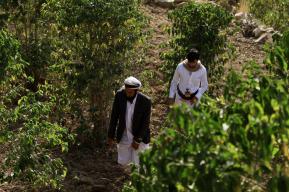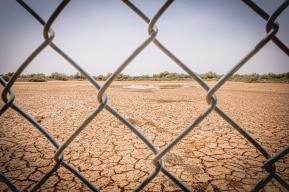The 68th session of the Commission on the Status of Women (CSW68), the UN’s largest annual gathering on gender equality and women’s empowerment, witnessed UNESCO's strong commitment to fostering gender equality, combating poverty and strengthening institutions across various fronts that are at the heart of its multidisciplinary mandate.
Through a UNESCO’s led side event and its participation as co-sponsor in up to ten additional events, UNESCO and its partners shed light on critical issues impacting women globally and lay the foundations for a more inclusive, fair and sustainable future.
Advancing gender equality through cross-cutting structural interventions
UNESCO led the side event “Eliminating poverty: structural interventions through education, culture and sciences” (March 13) addressing the intersectionality of gender equality, poverty eradication, and institutional strengthening. Experts, policymakers, and partners from the civil society and the private sector delved into UNESCO's action in fostering gender-responsive budgeting in education, empowering women in science for environmental action, supporting indigenous women's economic empowerment through culture and heritage and tackling gender bias and violence in artificial intelligence (AI).
The session notably shed light on the learning crisis faced by girls in developing countries, stressing the need for targeted investments in girls' education to achieve gender parity in funding allocation, and advanced fair financing initiatives to this end.
Education spending is inequitable: UNESCO data show that 59% of upper secondary school budgets and 72% of tertiary education funding favor male students. Gender-responsive budgeting is a powerful policy tool to correct this imbalance and pave the way to more equitable education financing.
The discussion also highlighted the experiences of young women leaders’ working in scientific fields related to climate change and good practices on the mobilization of women’s scientific and local knowledge to address environmental challenges for a sustainable future. Insights on the disproportionate impact of climate change on women and the importance of amplifying women's voices in environmental research and decision-making were raised.
It is crucial to have more women voices in environmental research and climate change negotiations, and men leaders who will advocate more strongly for those women and children left behind.
The event also delved into the transformative power of investment in living cultural heritage, illustrating how such initiatives can serve as catalysts for gender equality and economic empowerment, particularly for indigenous women, notably when operational programmes are implemented in collaboration with local communities, civil society organization and the private sector.
In our workshop, women learn that they can progress and contribute economically to their families. They witness firsthand that their work is valuable, transcending traditional gender roles.
The final part of the discussion focused on enhancing women's presence and influence in the digital realm, with particular attention given to two UNESCO studies examining gender biases and violence facilitated by generative AI, respectively Bias Against Women and Girls in Large Language Models and Technology-Facilitated Gender-Based Violence in an era of generative AI. The authors underscored the need for diversity in technology development and ethical frameworks to mitigate biases and ensure inclusivity.

We need to guide the algorithm to learn about equality, about human rights, for the algorithm to not be biased and give us predictions that are based on wisdom.
Among the recommendations, experts suggested innovative measures such as providing the algorithm with inclusive educational materials, integrating UNESCO's guidance in a manner that is both comprehensive and accessible.
Afghan women journalists under the Taliban: a testimony of bravery

UNESCO, along with International Media Support (IMS), UN Women, the European Union, the Ministry of Foreign Affairs of Denmark and the Swedish International Development Cooperation Agency (SIDA), co-organized the side event “Afghan Women Journalists Under the Taliban” (March 12) focusing on the plight of women journalists in Afghanistan. Experts and practitioners highlighted the challenges faced by Afghan women journalists and emphasized their heroic efforts to navigate restrictive environments and uphold journalistic integrity:
In Afghanistan, being a female journalist is an endless act of bravery. Women journalists have changed the narrative of journalism in Afghanistan and today, with the least resources, they strive to preserve and nurture freedom of expression in Afghanistan. They, without a face, name or identity are still striving to light a candle in the darkness.
The session echoed sentiments of hope and resilience, underscoring the importance of continued support for Afghan women amidst adversity:
The bewildered flower will bloom in a spring of freedom. I will sing a song of freedom over and over again
Education as a key lever for addressing poverty with a gender perspective
At CSW68, UNESCO, the leading entity of the UN system monitoring SDG 4, shared its unique expertise in closing the gender gap in education through its participation in a dozen of side events organized in cooperation with its partners, including UN Women, UNAIDS, UNICEF, and the African Union, among others.
UNESCO notably contributed to crucial discussions convened by the President of the General Assembly intended to foster the potential of technology for gender equality (March 12). UNESCO shared best practices as well as new knowledge and data produced to inform policies and programmes reinforcing women and girls’ digital skills while improving their access to technology.

Technology in education can be a lifeline to many girls and women who are otherwise excluded from learning, particularly in case in crisis in conflict countries.
UNESCO also co-sponsored several high-level side events as part of which it contributed to explore new strategies to leveraging education in emergencies for climate action (March 14), presented its action to drive accountability through the Global Platform for Gender Equality in and through Education (March 15), advocated for the advancement of gender equality in and through film and audiovisual media (18 March), and contributed to collectively assess progress on women and girls’ education in Africa (March 19).
In conclusion, UNESCO's contributions to the CSW68 underscored its multifaceted approach to empower women globally. From supporting the voices of women in conflict contexts to promoting gender-responsive budgeting for education, from combating gender bias and violence in technology to maximizing the potential of cultural heritage and creative industries for advancing gender equality and fostering the vital contributions of women for sciences and climate action, UNESCO remains persistent in its commitment to advancing gender equality and eradicating poverty through education, communication and information, culture, and sciences.















